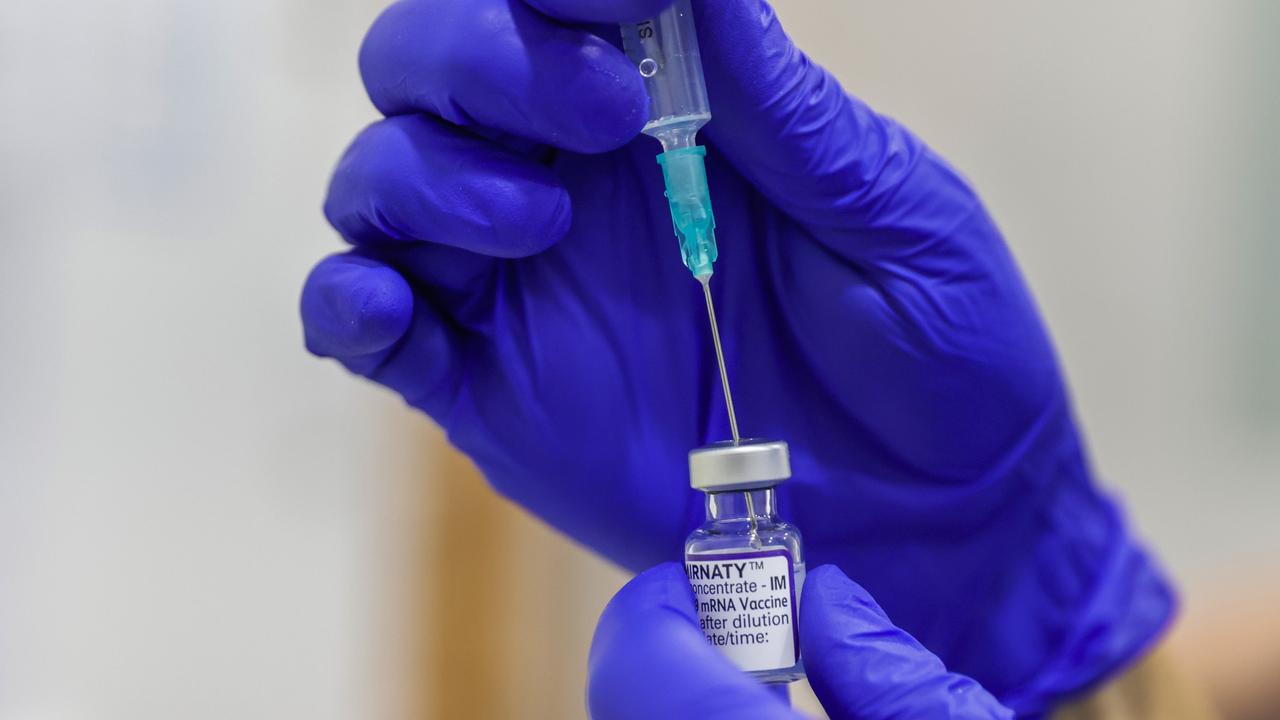Two passengers flying to Sydney from Africa have been confirmed with Omicron variant
Two passengers flying into Sydney on Saturday night from southern Africa have tested positive for the dangerous Omicron variant of Covid-19.
NSW Coronavirus News
Don't miss out on the headlines from NSW Coronavirus News. Followed categories will be added to My News.
Two passengers on a flight into Sydney from southern Africa have tested positive for the Omicron variant of Covid-19.
The two positive cases, who were asymptomatic, are in isolation. Both people are fully vaccinated.
The two passengers were amongst fourteen people from southern Africa who arrived on Qatar Airways flight QR908, Doha to Sydney, which arrived around 7 o’clock last night.
The remaining 12 passengers from southern Africa are undertaking 14 days of hotel quarantine.
Around 260 passengers and crew on the flight are considered close contacts and have been directed to isolate.
Meanwhile, the strain may already be circulating in Victoria with a passenger from South Africa travelling to Victoria from NSW this week.
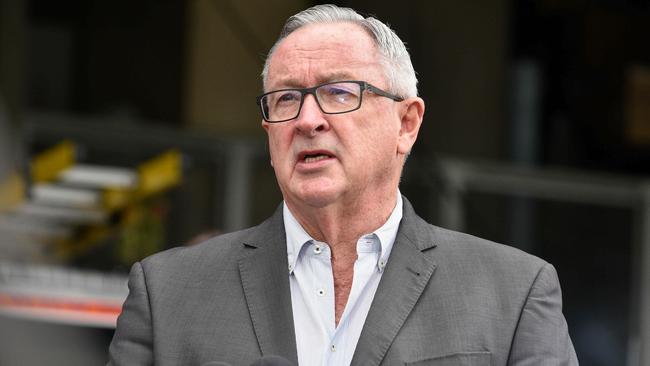
It’s understood a third potential case of Omicron arrived in NSW on November 23 and then travelled to Victoria two days later.
Health authorities are still waiting on genomic testing for the three potential cases.
Health Minister Brad Hazzard said there may be up to 100 people who have travelled to the South African hotspots in the past 14 days and who arrive in NSW by midnight tonight.
“Senior health officials are more inclined to view that it’s (Omicron),” he said.
Mr Hazzard said NSW Health and Border Force had been working “very well” by going through people who had previously arrived but the questions posed to returnees had been “loose” due to limited concerns at the time about the new strain.
He added that some returnees had “forgotten” where they had been in the past 14 days proving it difficult for authorities to comb through information.
He said the concerns were growing rapidly and authorities were finding many more arrivals from the hotspots that anticipated.
“We went from one anticipated person coming from southern Africa to 29. And on Sunday we’ve had a similar situation already having been told we would have 0 (potential) cases and already we’ve had more than 30 (arrivals from South Africa) and may well end up with more than 100 by midnight tonight. “
TESTS UNDERWAY ON PASSENGERS
Premier Dominic Perrottet will work closely with the states and Commonwealth to determine how to deal with the Omicron strain, he said this morning, as Health Minister Brad Hazzard warned the new strain might already be on NSW shores.
His vow came as Prime Minister Scott Morrison, who spoke with Mr Perrottet and Victorian Premier Daniel Andrews about the strain on Saturday, said the new variant was concerning.
“This clearly demonstrates that the pandemic is not over. The best thing that we can do is get vaccinated and get booster shots,” he said.
“Vaccination saves lives. As we move through our booster program, if it’s been six months since you received the second dose of a vaccine, you can now receive a booster shot.”
Health Minister Brad Hazzard said the virus was not “well understood” at this point.
“Delta … took only three weeks to get across 53 nations,” he said. “So we have to expect that it may well be here.”
Mr Hazzard said authorities had expected one South African to travel into Sydney airport on Saturday night but discovered 14 people travelling on a Qatar flight and another 15 on a second flight.
“That’s how we suddenly got to 29 people all off to health hotels,” he said.
Omicron scare as Sydney passengers from Africa tested
Urgent genomic testing is underway after two passengers who flew into Sydney from southern Africa on Saturday night tested positive for Covid-19.
Fourteen passengers who arrived in Sydney about 7pm are from one of the nine southern African countries — South Africa, Lesotho, Botswana, Zimbabwe, Mozambique, Namibia, Eswatini, Malawi, and the Seychelles — in which the new Covid variant Omicron has been identified.
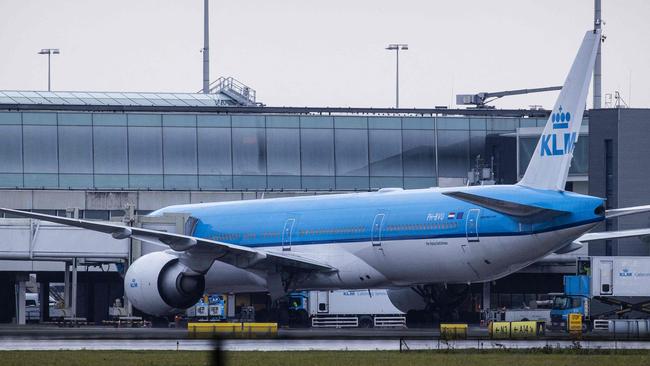
The infected passengers were taken to Special Health Accommodation, where they will undertake 14 days of quarantine.
Mr Hazzard said everyone on the Qatar flight had been deemed a close contact and were being contacted by NSW Health.
Close contacts will be contacted regularly, and compliance checks will be undertaken.
In line with new Commonwealth measures, all travellers arriving in NSW who have been in South Africa, Lesotho, Botswana, Zimbabwe, Mozambique, Namibia, Eswatini, Malawi, and the Seychelles during the 14-day period before they arrived in NSW must enter hotel quarantine for 14 days, irrespective of their vaccination status.
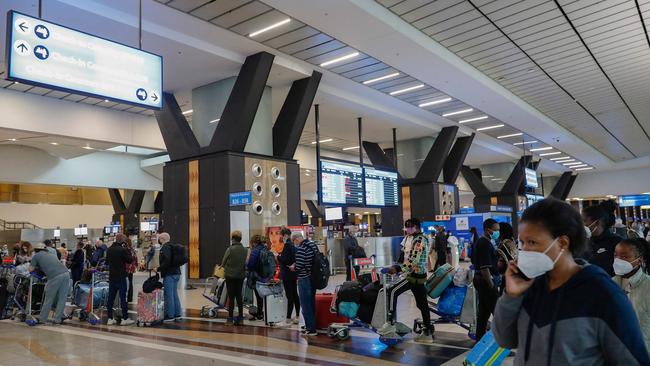
All travellers who have been in any other overseas country during the 14-day period before their arrival in NSW must travel directly to their place of residence or accommodation and isolate for 72 hours, pending further health advice.
All flight crew who have been overseas during the 14-day period before their arrival in NSW must travel directly to their place of residence or accommodation and isolate for 14 days or until their departure on another flight that leaves Australia, consistent with the current rules for unvaccinated flight crew.
“What needs to be done is there needs to be work internationally to establish the effectiveness of the vaccines that are available in their current form against this virus,” said Mr Hazzard.
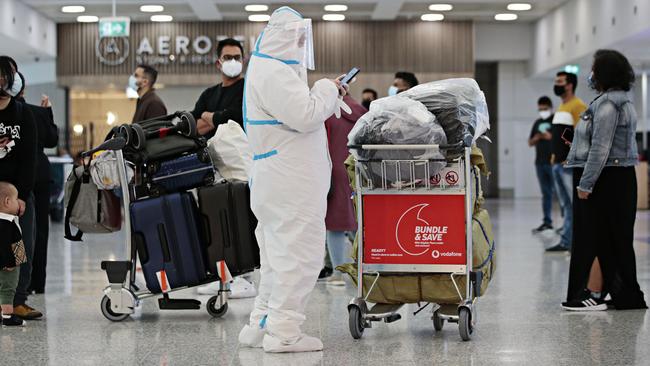
“The companies that have produced these vaccines are saying that it’ll take from three or four months to be able to work through that and make sure that the vaccines are adjusted accordingly.
“The challenges was always going to be in the poorer countries in the world. The challenge was to get vaccines into this country. It’s the world being held to account effectively for a more equitable approach to the world.”
Mr Perrottet said he had spoken to Prime Minister Scott Morrison to get a “uniform approach” to Omicron across the states.
“Ultimately we need to learn not just along the virus but also along the variants as well,” he said.
Mr Perrottet said he intends to continue with the reopening road map and there are no planned changes.
Anyone who has already arrived in NSW who has been in any of the nine African countries within the previous 14 days must immediately get tested and isolate for 14 days, and call NSW Health on 1800 943 553.
National Health officials to meet on new variant
Health officials will meet daily to discuss the latest information from overseas about the concerning new omicron Covid-19 variant, as states buy time with a 72-hour isolation requirement for all international arrivals.
Apologising for the “uncertainty” caused for Australians, Health Minister Greg Hunt said decisions about further restrictions were in the hands of the state public health units, who are meeting with Chief Medical Officer Professor Paul Kelly every day.
Mr Hunt said initial reports suggested Omicron is no more infectious or dangerous than existing strains, but Australia would continue to monitor international reports and data.
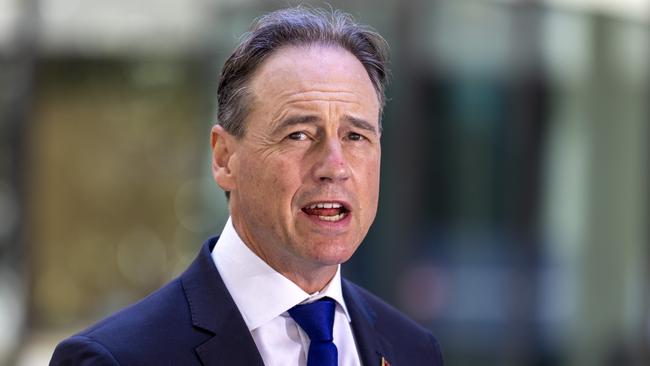
“At this stage, the preliminary advice which, of course, is subject to emerging evidence, is that we have seen no signs that this is a more dangerous disease in terms of its impact on hospitalisation, serious illness or loss of life,” he said.
“At this stage, we have seen no signs in relation to its resistance to vaccines but constant updating of medical advice has been what we’ve done throughout the pandemic.”
Mr Hunt said the genomic sequencing of the Covid-19 virus detected in several overseas arrivals from southern Africa had not been completed yet, but the results would be made public as soon as available.
“The sequencing can take a little bit of time, but … public health units are doing the work,” he said.
Mr Hunt said Australia would “not hesitate” to implement further restrictions to limit the potential spread of Omicron if required.
“We took a big step yesterday to block flight from nine countries to prevent the arrival of non-Australian citizens or residents from nine countries and to require the quarantine or for 14 days for people who have been in those nine countries was a significant imposition,” he said.
“It is a significant hardship, but it was an important step.”
PM addresses new variant of concern
Prime Minister Scott Morrison confirmed the new Omicron strain had moved from a
a variant of investigation to a variant of concern in 24 hours.
After speaking with the NSW and Victorian premiers, the Prime Minister said he backed their move to introduce a 72-hour isolation period for people arriving from overseas.
“These very fast moving issues that will continue as we always have sensible balanced, guided by the best possible medical evidence and medical expert advice,” Mr Morrison said.
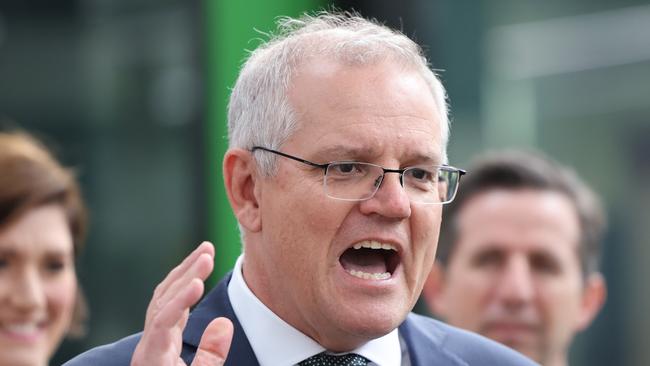
“But our intention, let’s not forget what the ultimate objective is here in this global pandemic, is to open safely and remain safely open.
“I’m quite encouraged by the fact that despite that we still have over 1000 cases on most days in Victoria, Victoria’s health and hospital system is standing up extremely well.
“It’s standing up in fact better than what the Doherty Institute modelling suggests.”
185 new cases recorded as NSW nears 95 per cent mark
The Omicron scare comes as NSW recorded 185 new cases of Covid-19 in the 24 hours to 8pm Saturday and the state hit 94.5 per cent of the population over the age of 16 having had their first vaccine dose.
The rate of fully vaccinated residents over the age of 16 is 92.4 per cent.
prominent syndromes and it has not yet been detected in vaccinated people.
The total number of cases in NSW since the beginning of the pandemic is 81,166.
There are currently 165 COVID-19 cases admitted to hospital, with 24 people in intensive care, 9 of whom require ventilation.
There were 54,150 COVID-19 tests reported to 8pm last night, compared with the previous day’s total of 62,044.
Health chief: New strain “impossible to keep out”
Victoria’s chief health officer says the concerning new Covid variant Omicron will be “impossible to keep out”, despite moves nationally to limit travel from infected countries.
Australia closed its border to several African nations amid the spread of the new, highly-transmissible variant, with both Victoria and NSW placing isolation requirements on all international arrivals.
Victoria’s chief health officer Brett Sutton on Sunday said the variant would likely become the new dominant strain, and new travel restrictions would “buy time” while authorities determined their next step.
“It’s going to be impossible to keep out, I imagine, so it’s still important to buy time,” he said.
“It won’t be over in Australia until it’s over globally, or until it’s under significant control and that won’t happen until there’s much higher vaccination coverage, especially in the poorest countries of the world.
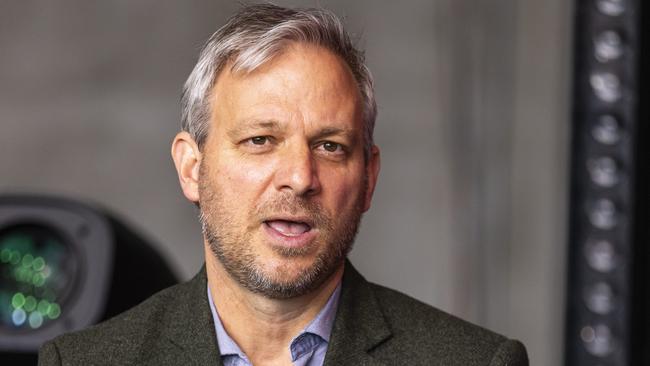
“We need to bear in mind that this will spread around the world and we’ll soon be facing this variant.”
Victoria on Saturday imposed a 72-hour isolation period for all international arrivals, but so far there are no restrictions on local residents.
Professor Sutton said the state was not back to square one, and high vaccination rates were useful.
“We’re all taking it seriously but we’re also calm, we know what to do,” he said.
“There is a lot more to find out about this variant of concern, but these measures will help buy us the time that we need to understand more about severity, potential vaccine escape and indeed how transmissible it might be.”
Professor Sutton said the new variant was a direct consequence of global vaccine equity, with vaccination coverage across the African continent in the “single figures”.
“It’s appalling and variants arise when there are opportunities for ongoing transmission with large numbers of people,” he said.
South African’s top doctor says Omicron is mild
A top South African doctor has said the Omicron Covid-19 variant is a mild disease without prominent syndromes and it has not yet been detected in vaccinated people.
“It presents mild disease with symptoms being sore muscles and tiredness for a day or two not feeling well,” South African Medical Association chairwoman Angelique Coetzee told media outlet Sputnik on Saturday.
“So far, we have detected that those infected do not suffer loss of taste or smell. They might have a slight cough. There are no prominent symptoms. Of those infected some are currently being treated at home.”
Ms Coetzee noted that hospitals have not been overburdened by Omicron patients and that the new strain is not been detected in vaccinated persons. At the same time, the situation might be different for the unvaccinated.
“We will only know this after two weeks. Yes, it is transmissible, but for now, as medical practitioners, we do not know why so much hype is being driven as we are still looking into it.
“We will only know after two to three weeks as there are some patients admitted and these are young people aged 40 and younger,” she said.
UK reimposes mask wearing to fight Omicron
The UK has tightened up rules on mask-wearing and on testing of international arrivals after finding two cases of the new potentially more contagious Omicron variant of the coronavirus that was identified just a few days ago in South Africa.
Amid fears that the new variant has the potential to be more resistant to the protection offered by COVID-19 vaccines, there are growing concerns around the world that the pandemic and associated lockdown restrictions will persist for far longer than hoped.
In an attempt to slow the spread in the UK, British Prime Minister Boris Johnson said it was necessary to take “targeted and precautionary measures” after two people tested positive for the new variant in England.
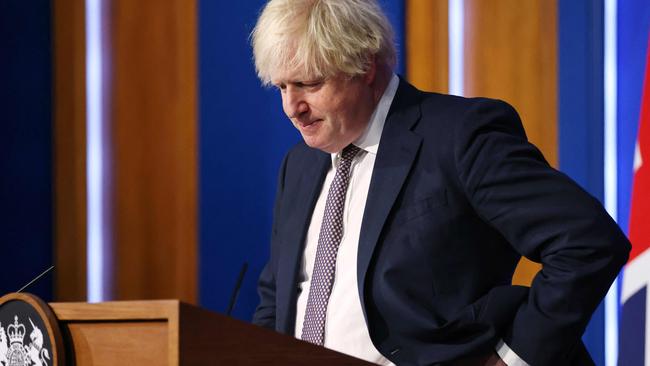
“Right now this is the responsible course of action to slow down the seeding and the spread of this new variant and to maximise our defences,” he told a news conference.
Among the measures announced, Mr Johnson said anyone arriving in England will be asked to take a mandatory PCR test for COVID-19 on the second day after their arrival and must self isolate until they provide a negative test. And if someone tests positive for the Omicron variant, then he said their close contacts will have to self-isolate for 10 days regardless of their vaccination status — currently close contacts are exempt from quarantine rules if they are fully-vaccinated.
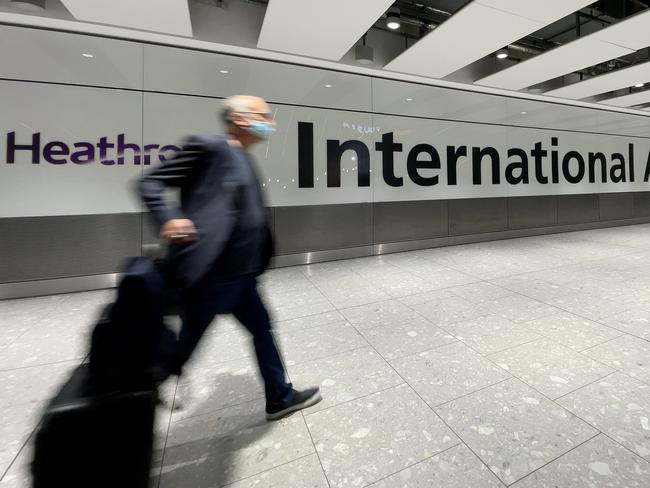
The US, Australia and Saudi Arabia have suspended travel from several African nations in response to a new and heavily mutated Covid variant.
The variant – officially labelled Omicron by the World Health Organisation – has 32 mutations, which is twice as many as the dominant Delta strain.
The WHO has listed the variant as one of official “concern”.
“Based on the evidence presented indicative of a detrimental change in Covid-19 epidemiology... the WHO has designated B. 1.1.529 as a variant of concern (VOC), named Omicron,” the UN health agency said in a statement.
It has already spread to Europe after first being detected in South Africa, Hong Kong, Botswana and Israel.
Markets plunged as news sank in that the new variant could potentially deal a heavy blow to the global recovery.
Scientists are now racing to determine the threat posed by the heavily mutated strain, and whether the current coronavirus vaccines should be adjusted.
“This variant has a large number of mutations, some of which are concerning,” the WHO statement said.
“Preliminary evidence suggests an increased risk of reinfection with this variant, as compared to other (variants of concern)”.
The number of Omicron cases appeared to be increasing in almost all provinces of South Africa.
US President Joe Biden told media he decided to ban travel from South Africa and seven other countries on advice from health officials.
“We don’t know a lot about the variant except that it is a big concern and seems to spread rapidly,” Mr Biden said.
“I’ve decided we’re going to be cautious. We don’t know a lot about the variant except that it is a big concern and seems to spread rapidly and I spent about a half-hour this morning with my Covid team led by Dr. Fauci so that was the decision we made,” he said.
Saudi Arabia also announced a temporary suspension of flights on Saturday to and from seven African countries – South Africa, Namibia, Botswana, Zimbabwe, Mozambique, Lesotho and Eswatini.
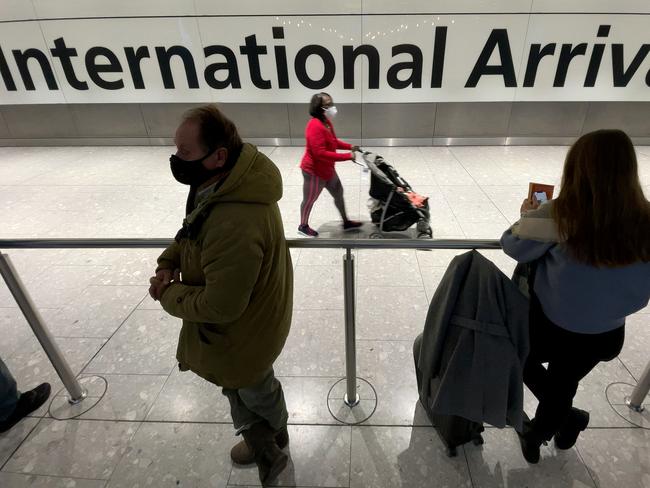
TRAVEL BANS AND RESTRICTIONS
Other countries have slapped restrictions on those travelling from the countries Omicron has been detected, including mandatory quarantine.
Many others – including several European countries battling a surge in Delta cases – have indicated they too will impose entry bans on non citizens from affected countries.
The Belgian government said that one individual who had recently arrived from Egypt, and was not vaccinated, had tested positive for the new variant, marking the first case in Europe.
South African officials initially said there was one confirmed case in a traveller from South Africa to Hong Kong. Then Hong Kong health authorities on Friday identified a second case of the B. 1.1.529 variant among returning travellers on the same floor of a designated quarantine hotel. Israel also has at least one confirmed case, according to the country’s health ministry.
The US ban comes as flights from South Africa as well Namibia, Lesotho, Botswana, Eswatini and Zimbabwe have been suspended and all six countries added to the Red List, UK Health Secretary Sajid Javid said.
Tulio de Oliveira, the director of South Africa’s Center for Epidemic Response and Innovation, said the variant has “many more mutations than we have expected,” adding it is “spreading very fast and we expect to see pressure in the health system in the next few days and weeks.”
Dr @mvankerkhove gives an update on #COVID19 virus variant B.1.1.529, during the #AskWHO session on 25 November 2021 â¬‡ï¸ pic.twitter.com/ZpflfEYzW9
— World Health Organization (WHO) (@WHO) November 25, 2021
Health experts say the variant could reduce vaccine effectiveness to as little as 30 per cent and there are signs it is more transmissible that the currently dominant Delta strain.
Lawrence Young, a virologist and a professor of molecular oncology at Warwick Medical School in the United Kingdom, said the variant was “very worrying.”
“It is the most heavily mutated version of the virus we have seen to date. This variant carries some changes we’ve seen previously in other variants but never all together in one virus. It also has novel mutations,” Young said in a statement.
WHERE DID NEW VARIANT COME FROM?
Virologists believe the strain is an offshoot of an older variant called B. 1.1, which was first spotted in Botswana.
Dr Tom Peacock, a virologist at Imperial College, posted details of the new variant, noting it was the first time he had seen two particular mutations in one variant.
“Export to Asia implies this might be more widespread than sequences alone would imply,” he tweeted.
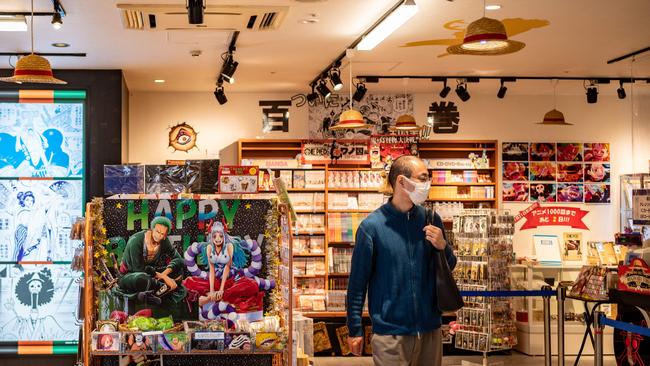
“Also the extremely long branch length and incredibly high amount of spike mutations suggest this could be of real concern (predicted escape from most known monoclonal antibodies).
“Worth emphasising this is at super low numbers right now in a region of Africa that is fairly well sampled, however it very, very much should be monitored due to that horrific spike profile (would take a guess that this would be worse antigenically than nearly anything else about).”
Experts say new variants are found fairly often, and mostly don’t spread over a cluster of cases. They can also quickly die out if they present in a country with a more dominant variant.
Covid-19 Incident Director at the UK Health Security Agency, Dr Meera Chand, told the Sun: In partnership with scientific bodies across the globe, is constantly monitoring the status of SARS-CoV-2 variants as they emerge and develop worldwide.
“As it is in the nature of viruses to mutate often and at random, it is not unusual for small numbers of cases to arise featuring new sets of mutations.
“Any variants showing evidence of spread are rapidly assessed.”
More Coverage
Read related topics:COVID NSW




